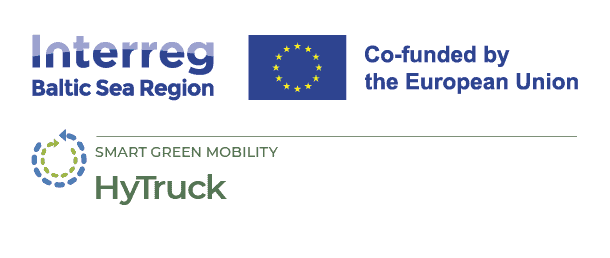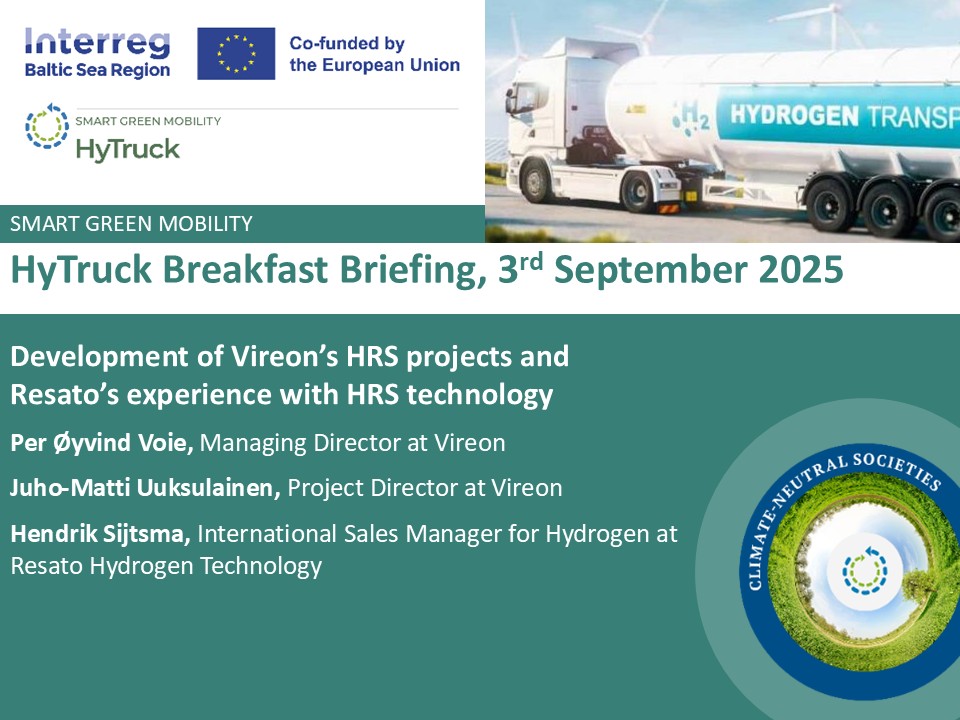
Keeping up ambitions, adapting to market risks: Vireon's strategy for HRS network expansion in the Nordics
15 September 2025
Mr. Uuksulainen and Mr. Voie introduced the ongoing Vireon’s HRS development projects in Finland and the Nordics as well as their perspective for the decarbonization of heavy-duty transport. Vireon Hydrogen as a young company spun out from Norwegian Hydrogen, with subsidiaries in Norway, Sweden, Denmark, and Finland, focusing on hydrogen distribution for heavy-duty vehicles and supporting infrastructure, including both fixed and mobile refueling stations.
Mr. Voie clarified that truck OEMs are currently reluctant to deliver hydrogen fuel cell trucks, resulting in slower infrastructure rollout and a need for industry-wide stamina to match market growth. This has led to still increasing emissions from heavy duty transport.
Vireon Hydrogen’s business model involves close cooperation with other green hydrogen producers and selective in-house production to ensure valuable customer offering. Mr. Voie noted that rapid network expansion without sufficient vehicle uptake could risk financial sustainability, leading to a more measured approach to station capacity and network growth.
Mr. Uuskulainen then described the Vireon Hydrogen’s Finnish initiatives. They include a four-station corridor to connect Finland with other Nordics, a priority Helsinki station in partnership with Helen, and a five MW electrolyser project in Jyväskylä. The Helsinki station will be located in Vuosaari, which is a primary logistical port in Finland. The initial operational goal was set to be operational in 2026 but it will probably be delayed until 2027.
Mr. Uuksulainen also addressed the challenge of limited hydrogen trucks in Finland. Vireon has already engaged in cooperation with OEMs, including a demonstration event in the Netherlands with Finnish logistics companies, test-driving MAN’s hydrogen combustion truck and familiarizing stakeholders with the technology.
During the second half, Mr. Sijtsma talked about Resato’s HRS technology expertise, client-focused solutions and implementation experience in both public and private HRS construction. Resato originated as an engineering firm specializing in high-pressure gases, transitioning from oil and gas to hydrogen over the past decade.
Mr. Sijtsma described Resato’s products and their technological expertise. The products can handle ultra-high pressures (2000–10,000 bar), providing stable hydrogen refueling stations for various capacities, from small fleets to large trailer filling stations up to 10 tons per day, with a focus on modularity and scalability.
Mr. Sijtsma also highlighted the current misalignment of the funding schemes that affect all the parts of the hydrogen value chain from production to refueling stations and vehicles. The challenges in funding can lead to hindrances in the development of the infrastructure. He emphasized that integrated programs are needed to ensure market growth.
With their long experience in the energy sector, Resato advises operators to prioritize operating expenditures and business case viability instead of capital expenditures. Mr. Sijtsma also noted that subsidy-driven station construction can lead to unsustainable operations if there are not enough vehicle offtake. Such challenges have been experienced in Germany and Sweden.
There are significant technological challenges in hydrogen refueling stations. These include compression, storage and cooling. According to Mr. Sijtsma compression is the most critical issue when regarding cost and reliability. Robust engineering and good quality components are needed to ensure reliable functionality of the stations.
During the Q & A session Mr. Voie addressed questions about the Vireon stations AFIR compliance and the station capacity. The stations are AFIR compliant but there is still uncertainty about the countries that will implement AFIR. This might lead to a need for adaptable capacities. Station capacity was intended to be increased from one ton to two tons. However, the market growth has been slower than anticipated and has delayed the capacity increase need.
Mr. Sijtsma clarified that Resato focuses on gaseous hydrogen and for which applications their stations are available now. For example, maritime applications are not yet available due to lack of standardization. Trains on the other hand are more customized and stations can be designed for their needs.
The next HyTruck Breakfast Briefing meeting will be held on Wednesday the 1st of October at 9:00 CET. The event will be hosted by CLIC Innovation, a partner of HyTruck project. And during the event we will hear pitches from all HyTruck partners about the key results and impact of their activities in the project.






